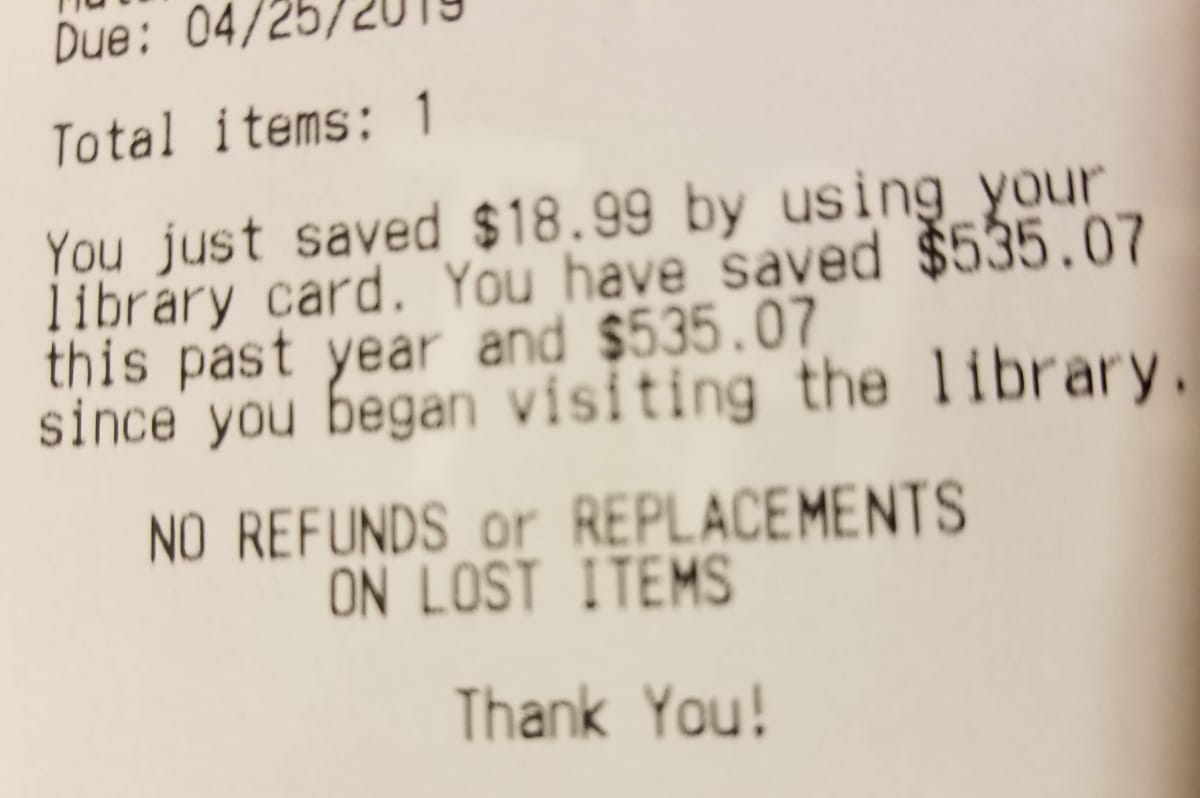What Quietly Helps Hold Democracy Together

There's a place where you can take stuff home for free and be trusted that you'll bring it back.
The stuff isn't grimy or second-rate or chaotically strewn about, but systematically organized, updated, and cared for by professionals.
This place also offers other free services, too.
And there are tens of thousands of these places across the country; 123,627, in fact.
As you probably guessed, dear friends, this is our grand public library system. Brought to us, primarily, by taxpayer dollars.
Your April 15th contributions help your library get more copies of the latest Colson Whitehead and Margaret Atwood, beef up their e-book collection, hire a second children's library because Story Hour is standing room only, buy another computer that'll be used by kids without wifi at home to do their Social Studies assignments.
"When I graduated from high school, it was during the Depression and we had no money," said author Ray Bradbury. "I couldn’t go to college, so I went to the library three days a week for 10 years."
And this free access to information in America began over in quiet little Peterborough, New Hampshire. At their April 1833 Town Meeting, a Peterboroughan raised a successful motion to create a library owned by the residents, paid for by their tax dollars.
Town Meeting is a type of local government in some small New England towns where all registered voters effectively serve as the town's legislative body and vote on the budget, zoning changes, and other matters, all usually during an annual meeting. And you know who was evidently a big fan of Town Meeting? One Mr. Alexis de Tocqueville. Boom.
The first place my folks took me after I was born was the public library in town. It's a library that exists because in 1964, Mr. Terrence Christy's 8th grade social studies class decided it should.
Until that point, this little coastal city had a library in the high school that was open to the public two nights a week. A few months of research later, the 8th graders pitched the City Council on an open-during-the-daytime, many-days-a-week kind of public library.
The Council did what any government body worth its salt would do: it created a task force to study the idea.
If it seems like legislative bodies create task forces to delay taking action, sometimes that's true. But sometimes it's key for understanding how an issue plays out on the ground, to hear from and build buy-in with stakeholders, and wrangle implementation into a workable form.
This speedy task force had the city breaking ground in 1965 for a new library building. And how, pray tell, did this modest little city pay for a new building?
The federal government footed 58% of the bill. Specifically, the Library Services Act, which provided money for libraries in towns of less than 10,000.
If you're thinking that a law doing such a solidly good and decent thing deserves a spiffier name, it did get a name change! It is now the Library Services and Technology Act. And this is what you get when poets don't run for Congress.
Now we cannot go one word further without discussing Edith Green, the absolute Stick of Dynamite out of Oregon's 3rd Congressional District who made the Library Services Act happen (and who history should throw a few more bones).
Congresswoman Green, a former elementary school teacher in Salem, Oregon, spent her time on Capitol Hill banging out landmark bill after landmark bill. She brought us...
- The Equal Pay Act of 1963 which established equal pay for equal work.
- The Higher Education Facilities Act of 1963, which provided funding for, among many other things, building our nation's technical and community colleges. President Lyndon Johnson called it, "the most significant education bill passed by the Congress in the history of the Republic."
- The Higher Education Act of 1965, which created the Pell Grant, Upward Bound (whose alumni include Viola Davis and Patrick Ewing), and a whole host of other federal aid programs for students, colleges, and universities.
- Oh yes, and Title IX, a team effort with Senator Birch Bayh and Representative Patsy Mink, the first woman of color in Congress.
But before all those gamechangers became law, the gentlewoman from Oregon got the Library Services Act to President Eisenhower's desk. And because of it, 288 bookmobiles were purchased and hit the roads of rural America, 800 library staff were added, sparsely populated areas began to get the library services they deserved, and a little city in coastal Maine got a proper library building.
These days, the lion's share of annual public library funding - around 86% - comes from local and state taxes. (And for those who think librarians go into it for the big bucks, the average salary is $61,660.)
That humble library card - which one librarian described as the most important card in your wallet - democratizes access to information. And organizes it, too. Or as writer Neil Gaiman says, "Google will bring you back, you know, a hundred thousand answers. A librarian will bring you back the right one."
I once heard that libraries, and public parks, are the only place in our country where you don't have to buy anything or believe anything to belong.
The opposite of belonging is isolation, which can easily foment distrust. And distrust is rich soil for cynicism to grow in. While a healthy democracy benefits from the useful questioning of skepticism, it falters in the contempt and disengagement of cynicism.
But it's awfully hard to feel a sense of belonging and cynicism at the same time. So, essential, if silent (or at least inside-voice volume) civic strings are being tied together at libraries.
Put another way: "The only thing that you absolutely have to know," said Albert Einstein, "is the location of the library."
